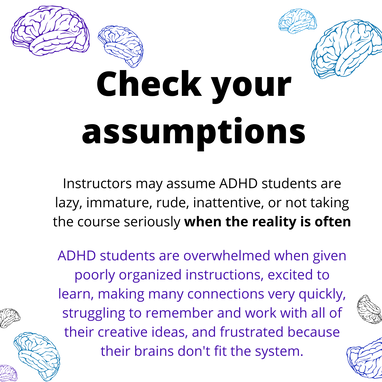Here's my advice on how to design your course to be more ADHD-friendly. Many of these tips will help students regardless of #ADHD diagnosis: scaffolding large projects and being abundantly consistent about instructions.
#Academia #UDL #HigherEd #AcademicChatter #DisabledInSTEM
theadhdacademic.weebly.com/tea…
Course design - ways to help ADHD folks
Learning environments are often not created with ADHD learners in mind; struggles with working memory, regulating attention, and executive functions create different challenges for us. Making your...the ADHD Academic

Matt Campbell
in reply to theADHDacademic • • •Ryan Randall
in reply to Matt Campbell • • •@matt 1) Having assistance breaking large projects into smaller tasks is something that ADHD people can often receive as workplace accommodations, so this is an acknowledged problem in the work world rather than something exclusively expected of individual employees themselves. (See askjan.org/disabilities/Attent… as an example.) Workplaces, like many instructors, are invested enough in people's success that they will work with them to help make it happen.
2) Just like any other skill, most learners will acquire the ability to break things down into smaller chunks if they have it explicitly modeled for them, rather than absorbing it through osmosis.
3) Almost all learners—ADHD or otherwise—will produce work that's more what the instructor has in mind if they receive some degree of formative feedback along the way. Chunking projects helps this feedback be more manageable / useful for everyone.
Attention Deficit/Hyperactivity Disorder (ADHD)
askjan.orgB Haas
in reply to Matt Campbell • • •Matt Campbell
in reply to B Haas • • •B Haas
in reply to Matt Campbell • • •Kit Muse
in reply to Matt Campbell • • •@matt @belehaa Setting students up for success in the world "as it is" means setting them up for burnout and mental health issues including a higher risk of suicide.
How about we create learning and working environments that support everyone's talents and allow everybody to thrive?
Nic, Fermenting The Vibes
in reply to Kit Muse • • •@KitMuse @matt @belehaa Yeah exactly. Expecting people with ADHD to live without accommodations rests on the belief that either:
-ADHD is not a "real" disability or;
-Disabled people do not deserve accommodations
Both are ableist.
Matt Campbell
in reply to Nic, Fermenting The Vibes • • •@PacificNic @KitMuse @belehaa I don't believe either of those things. But I wonder if ADHD requires accommodations from teachers, employers, etc., or if it only requires the people who have it to know how to work around their own disability.
I'm legally blind. I understand why a sensory disability requires external accommodations. I just wonder if the same applies to ADHD. I should probably go off and learn more about this on my own before I say anything more.
Kit Muse
in reply to Matt Campbell • • •lilo
in reply to Matt Campbell • • •theADHDacademic
in reply to Matt Campbell • • •@matt Why should it be up to the teacher to teach how to write a project proposal, how to evaluate a project's success, how to work as part of a team? Aren't these skills that the student will need to learn to do for themselves when they want to take on a large project in the workplace?
Read more about scaffolding as an educational term. It's about gradually removing support over time so that the students work independently eventually rather than chuck them off the deep end and see who swims.
Matt Campbell
in reply to theADHDacademic • • •theADHDacademic
in reply to Matt Campbell • • •